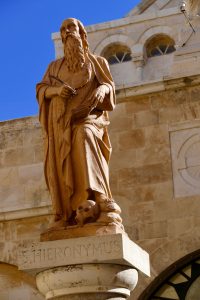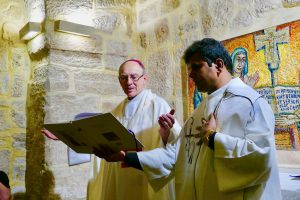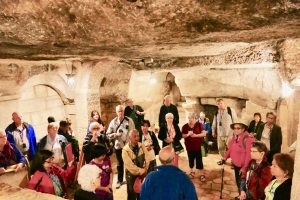HOMILY WEEK 26 01 – Year I
Loving and Living the Word with Humble Faith and Childlike Simplicity:
Memorial of St. Jerome
(Zech 8:1-8; Ps 102; Lk 9:46-50)
**************************************************************
Have you ever heard God speaking to you? Would you like to have a more intimate relationship with God?
Then love, and live the Word of God with humble faith and childlike simplicity.
We have a wonderful example of this in the prophet Zechariah, who has an experience of the Word of God coming to him, instilling in him a great care for Jerusalem, assuring him God will again dwell in Jerusalem, that God will save God’s people, and they will someday live in fidelity to God and follow God’s ways in righteousness.
Perhaps we are all like Zechariah, if we stop to think of it, each of us having that kind of experience. I remember during a thirty-day retreat at the Immaculate Heart Retreat Centre out of Spokane, as a young scholastic before my ordination, being advised by the director, Fr. Armand Nigro S.J. during points in the evening to pray for all the gifts of the Holy Spirit. Being in the stage of first fervor at that time, I took him seriously, sat under an evergreen tree the next morning, and prayed earnestly for that experience, full of eager expectation. That experience proved to be the driest, most boring, most disappointing prayer hour during that whole retreat!
After it was over, I sat under that tree, feeling a bit deceived and sorry for myself, when I suddenly noticed a spider’s thread right in front of my nose. Depending on the slight breeze and dappled sunlight, it would appear and disappear. Suddenly I distinctly heard the words “My grace is fine as a spider’s thread, always there. Most of the time you won’t see it” not with my ears, but within my head. I looked around but there was no one in sight. With awe I realized that was the answer to my prayer – not the bombastic experience I was wanting and expecting, but a subtle inner voice/thought giving me the message that in my life, God’s grace would be a delicate, daily presence, not a more experiential outer experience. And that lesson has stayed with me ever since, a moment of consolation to carry me through even months of desolation.
Jesus, in the gospel, teaches us another very important lesson – to have humble faith in him lived out with childlike simplicity. The apostles, far too symbolic of our church life today, completely miss the example of the lifestyle of the master they are with, and focus instead on the worldly goals of possession and pleasure, prestige and fame, power and control. They are arguing about who among them was or would be the greatest. Jesus has to stop them, point to a little child as the greatest person in his kingdom, and proclaim point blank that the least among them is actually the greatest. He is trying to get through to them a lesson we still struggle to accept today – humble faith in Jesus is to be lived out in the Church in childlike simplicity, not at all in the ways of the world focused on money, fame and power.

St Jerome, Church of the Nativity, Jerusalem
Today the Church invites us to honor and emulate a great example of someone who truly lived these teachings, St. Jerome, who was born in Dalmatia about 342 and baptized in Rome by Pope Liberius. Having experienced a vision of Christ, Jerome withdrew into the Syrian desert for four years, praying, fasting and learning Hebrew. He was ordained in 377. Jerome’s mastery of language enabled him to translate Hebrew and Greek books of the Bible into Latin, the language of the common people; this translation is called the Vulgate. In the 16th century, the Council of Trent declared Jerome’s Vulgate an official text of the Catholic Church.
Jerome’s rhetorical skill coupled with his fiery temperament made him a fierce opponent in theological debate and involved him in controversy most of his life. His last years were spent in Bethlehem, where a group of noble Roman women under his spiritual direction used their wealth to build convents, monasteries and hospices. These consecrated women, led by St Paula, are regarded in Church history as a powerful witness to early Christian feminine spirituality. Jerome died on this day in 420. His accomplishments in biblical studies are without parallel in Christian history. He is a Doctor of the Church, and patron of scripture scholars, translators, archeologists, librarians and students.
In some ways, Jerome is like Zechariah, to whom the Word of God came and who dedicated his life to strengthening the faith of the Israelites in God who would deliver and restore them to fidelity and righteousness. Jerome is also in many ways like St. Paul, who met Jesus on the road to Damascus, realized he was the Messiah, the Risen Lord reigning over all of creation, went to Arabia to reread the Old Testament scriptures in that light, integrated how loved and forgiven he was by God, and devoted the rest of his life to proclaiming Jesus as Lord and building up the Church as the Body of Christ.

Presiding in a cave, with Fr. Susai OMI
With St. Paul and St. Jerome as models, we are invited to imitate them in their response to Jesus, to believe in him, to fall in love with his Word, and to live it out with humble faith and childlike simplicity. I have twice had the privilege of visiting the Church of the Nativity in Bethlehem, built over the caves where St. Jerome spent his last days, and celebrated the Eucharist in two of those caves with our pilgrimage groups.

Pilgrimage group touring cave where St. Jerome lived and worked
Inspired by St. Jerome, who was focused on the Word of God in the earliest centuries of the church, I had a dream as an active bishop of a diocese to begin a secular institute of women who would be dedicated to spreading the Word of God, called Servants of the Word. I shared that dream Lucie Leduc, director of the Star of the North Retreat Centre where I serve as chaplain and spiritual director, who expanded it. She envisages a society of men and women, families and youth, possibly called Servants of the Word and Creation. Just what that would involve is in process. But how true it is – a dream kept to one’s self remains just a dream; a dream shared has a chance of becoming reality.
Personally, I love doing a monthly poustinia (the Russian word for desert) which involves resting, writing, fasting on water alone, and praying a series of “holy hours” in the style of Lectio Divina for a period of twenty-four hours. This homily, in fact, is the fruit of such a poustinia. I would see this monthly poustinia being the practice of this fledgling society. The goal would be, like St Jerome, to ponder the Word of God and to spread love for God’s word among all people.
The Eucharist consists of two tables – both of them very biblical – the table of the Word (the Jewish synagogue) and the table of the Eucharist (the Jewish temple). We are first nourished by God’s word, and then we offer to the Father the sacrifice of the Word, his own Son, who died to demonstrate, once and for all, the depth of the Father’s love for all of humanity and all of creation, which is also groaning to be set free from its constraints.
May our celebration empower us to emulate Zechariah, St. Paul and St. Jerome in love for and living out God’s word with humble faith and childlike simplicity.




We are to express the love and compassion towards other people and even our enemies. We are to love our Father or God the same way with respect and dignity. When we receive the Eucharist we are to be humble in faith and childlike simplicity. We are to live out the word of God by experiencing Jesus ‘ unconditional love, mercy , forgiveness during his pain and suffering . We should understand everything he did for us when he died on the cross . He carried all our sins or faults while carrying the cross. So let us lift up our cross and do the same by receiving redemptive sufferings so we can repent and change our ways and who we are. This is the step to be forgiven and healed as sign to be humble . We are to live beyond the reign of God and the Kingdom of God. Lastly, we are to love one another as we love ourselves ; including our enemies. We are to respect the Father’s love for all humanity and all creation which is to be set free from constraints. Amen.
Thanks Bishop Sylvain Lavoie for the inspiring words and beautiful teachings. May God Bless you on your mission . ???????❤️❤️???????